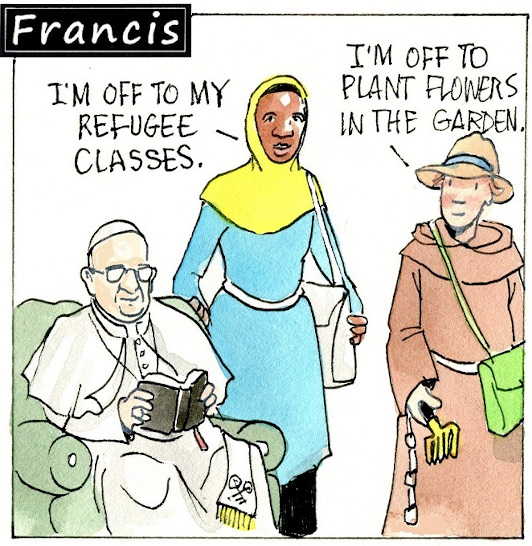



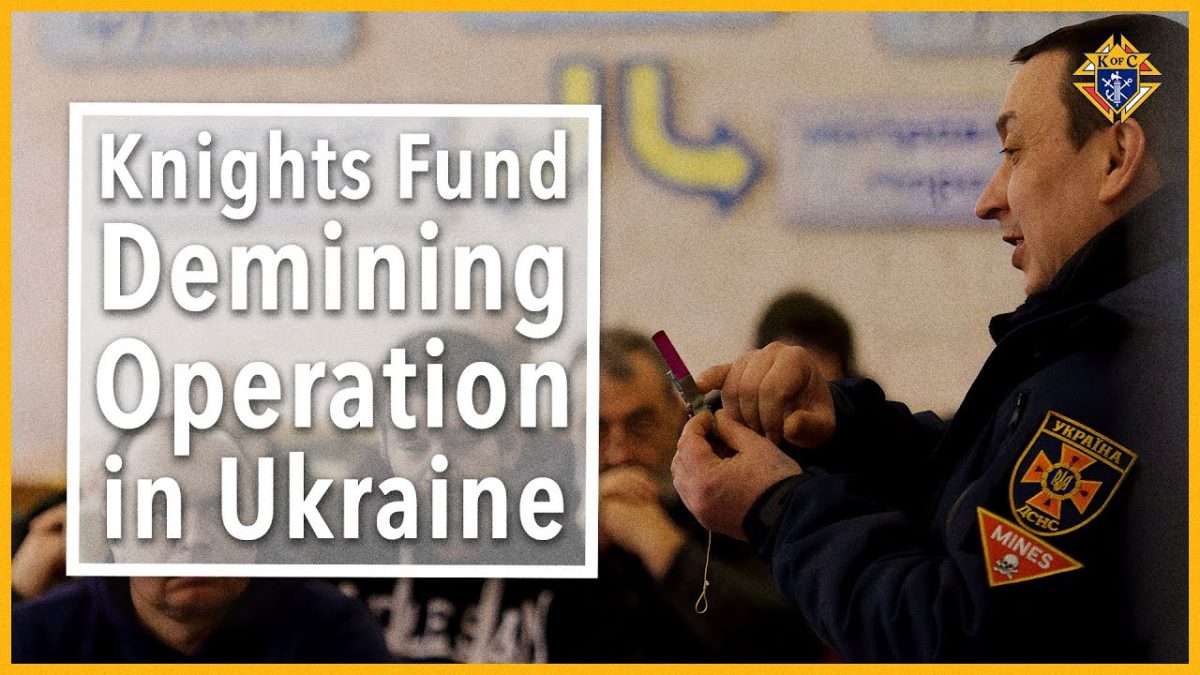
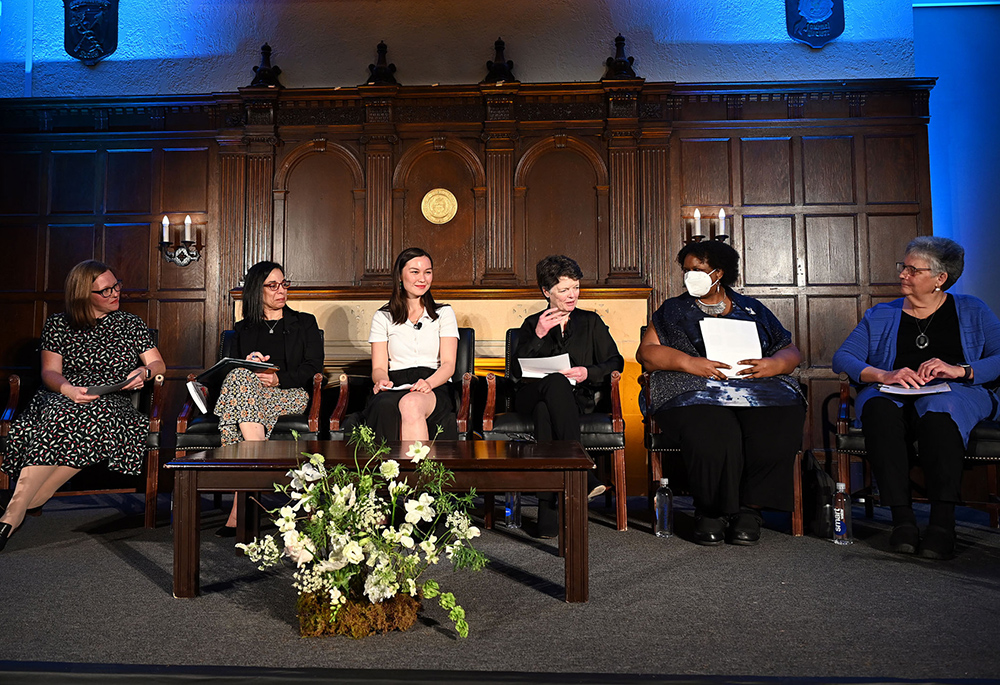

Several institutes at Georgetown University hosted a conversation on women’s ordination in the Catholic Church on April 17, with a five-member panel of theologians and local lay leaders discussing the church’s answer on the issue as « unfinished. »
Among the speakers was acclaimed novelist and National Book Award winner Alice McDermott, who reflected on the meaning of the sacraments and said the church’s practice of ordaining only men as ministers had become something like a counter-sacrament for her.
« If there are outward signs of inner grace, then surely there are outward signs of inner corruption as well, » said McDermott, author of eight novels. « Outward signs that betray our faults, our sinfulness and our failures. »
« It grieves me to say that the all-male priesthood of the Catholic Church, my church, has become for me just such a sign, » she said.
Theologian Mary Hunt, co-founder and co-director of the Women’s Alliance for Theology, Ethics, and Ritual, or WATER, said the decision not to ordain women « has left the institutional Roman Catholic Church in an intellectually and morally untenable position without much credibility to announce any good news. »
« The loss of the enormous talent and generosity of women and nonbinary persons wishing to engage in Catholic sacramental ministries has diminished the quality and quantity of ministry for all, » she said.
The Georgetown event was held in part to honor the work of Holy Names of Jesus and Mary Sr. Anne E. Patrick, a moral theologian who died in 2016. In 1975, Patrick wrote an essay entitled « A Conservative Case for the Ordination of Women, » which argued that ordaining women would help with a then-looming crisis of decline in priestly numbers and would « touch the hearts of women who … are growing increasingly conscious of their dignity as persons. »
Besides McDermott and Hunt, the speakers for the event included theologian Teresa Delgado, dean of the College of Liberal Arts and Sciences at St. John’s University in Queens, New York; Angele Cabrini White, founder and chairperson of the Black and Women’s History Ministry at St. Martin of Tours Catholic Church in Washington; and Lin Henke, a Georgetown senior.
Jane Varner Malhotra, director of advancement communications at Georgetown and a niece of Patrick, opened the event. Malhotra said she has been discerning a call to priesthood herself.
« To me, and to many of us in the church, the question of women’s ordination is, yes, institutional but also deeply personal, and sometimes painful, » she said. « But it’s also an experience of joy and creativity, because with God all things are wildly possible. »
White offered a wide overview of U.S. Catholic history, focusing on how for the early part of American history Catholics were often a persecuted minority group. She said that history shows that change can take a long time to occur.
« Change takes learning from mistakes and working towards better, » she said. « It does not mean settling for something that is unjust. It does not mean seeking equality. It means gaining equity. »
« It’s not that we as women want to be accepted, » said White. « It is that many men in leadership are not receptive. It’s not that women don’t already lead in the church. It’s just that many men prefer the club of men in leadership. »
Advertisement
Henke, who is preparing to graduate and plans to pursue graduate education in ministry, said the « theological stakes are very high » in terms of whether the church allows women’s ordination.
« It is not enough to say that women could resemble God, as long as they keep parts of themselves toned down, » said Henke, who is a non-Catholic Christian. « We cannot let our purpose and worth be defined by a narrow and inaccurate view of God. »
During the question-and-answer session following the initial discussion, a Georgetown student asked the panelists how they understand the church’s official position, as described in Pope John Paul II’s 1994 apostolic letter Ordinatio Sacerdotalis, that it has no authority to ordain women as priests.
Delgado suggested that adding more voices to the discussion about the church’s authority on the matter might help in future conversations.
« Perhaps the more diverse voices that we have … in the conversation, allows us to find that truth more clearly, in a way that has been obscured in the past, because there have been so few, » said the theologian. « We clearly see that adding more voices to that very question about where is the truth will lead to different kinds of answers. »
« I would say: Why be afraid of that? Why be afraid of the possibility that somehow what we have known to be true may not have been? » said Delgado.
« We need to see truth with a broader lens, » she said. « I’m thinking that that’s the moment we are in right now. And perhaps there are some who don’t want to engage in that questioning, because it will crumble the truth that they’ve known. »
The event was titled « Faith, Feminism, and Being Unfinished: The Question of Women’s Ordination. » It was sponsored by Georgetown’s Women’s Center, and co-sponsored by the Berkley Center for Religion, Peace and World Affairs; the Office of Mission and Ministry; the Georgetown Women’s Alliance; the Gender+ Justice Initiative; and the Department of Theology and Religious Studies.
Annie Selak, a theologian who serves as the associate director of the Women’s Center, moderated the discussion. The event also featured a simultaneous, live art painting by St. Joseph Sr. Celeste Mokrzycki, the chaplain for the School of Nursing and the School of Health at Georgetown.
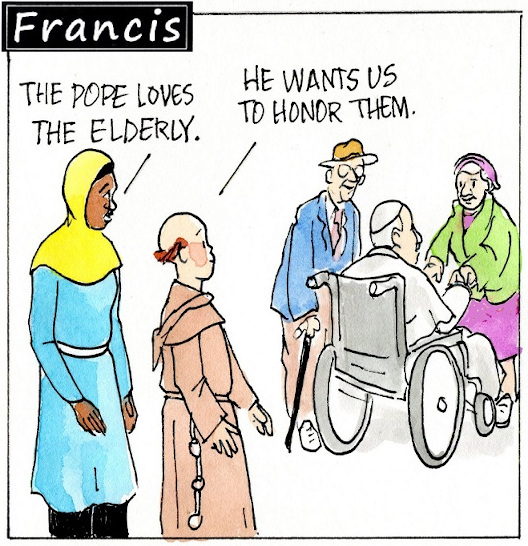

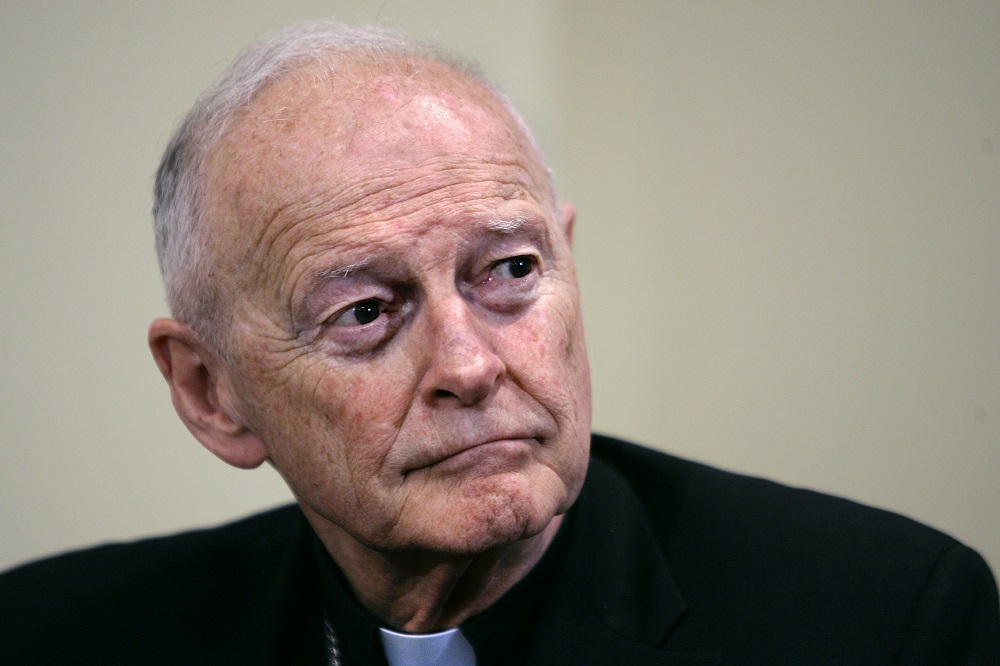

The defrocked Roman Catholic cardinal who became the face of the church’s clergy sex abuse crisis has been charged in Wisconsin with sexually assaulting an 18-year-old man more than 45 years ago, court records show.
A criminal complaint filed April 14 alleges that Theodore McCarrick, who was removed from the priesthood in 2019 after a Vatican investigation found he had sexually molested adults and children, fondled a man in 1977 while staying at a cabin on Geneva Lake in southeastern Wisconsin.
The alleged victim, who is not named, told investigators that McCarrick had repeatedly sexually assaulted him since he was 11 and even brought him to parties where other adult men sexually assaulted him, according to the complaint.
McCarrick became the highest-ranking Roman Catholic official in the U.S. to face criminal charges for sexual abuse when he was accused in 2021 of sexually assaulting a teenage boy in Massachusetts at a wedding reception in 1974. His attorneys asked the judge in that case earlier this year to dismiss the charges, saying that McCarrick, now 92 and suffering from dementia, is not competent to stand trial.
The once-powerful priest was ordained in 1958 and became archbishop in Newark, New Jersey, in 1986 and then archbishop of Washington, D.C., in 2000. He rose to power despite church officials’ knowledge of accusations against him. A two-year Vatican investigation into McCarrick’s tenure found credible reports of his problematic behavior dating back to 1999, including an inquiry confirming that McCarrick had slept with seminarians.
The church has confirmed it made financial settlements with adults who accused McCarrick of sexual misconduct. McCarrick retired in 2006 but continued to be active in political circles until he was defrocked by Pope Francis in 2019.
Wisconsin prosecutors learned of the alleged 1977 assault through a program dedicated to prosecuting instances of abuse by faith leaders, according to a news release. Officials were able to charge McCarrick because the statute of limitations does not apply to people who are not residents of the state. A similar law allowed Massachusetts prosecutors to bring their case against McCarrick more than 40 years later.
McCarrick’s attorney in Massachusetts, William Fick, did not immediately return a phone call or email sent Monday. An attorney for McCarrick has not yet been listed in the Wisconsin case.

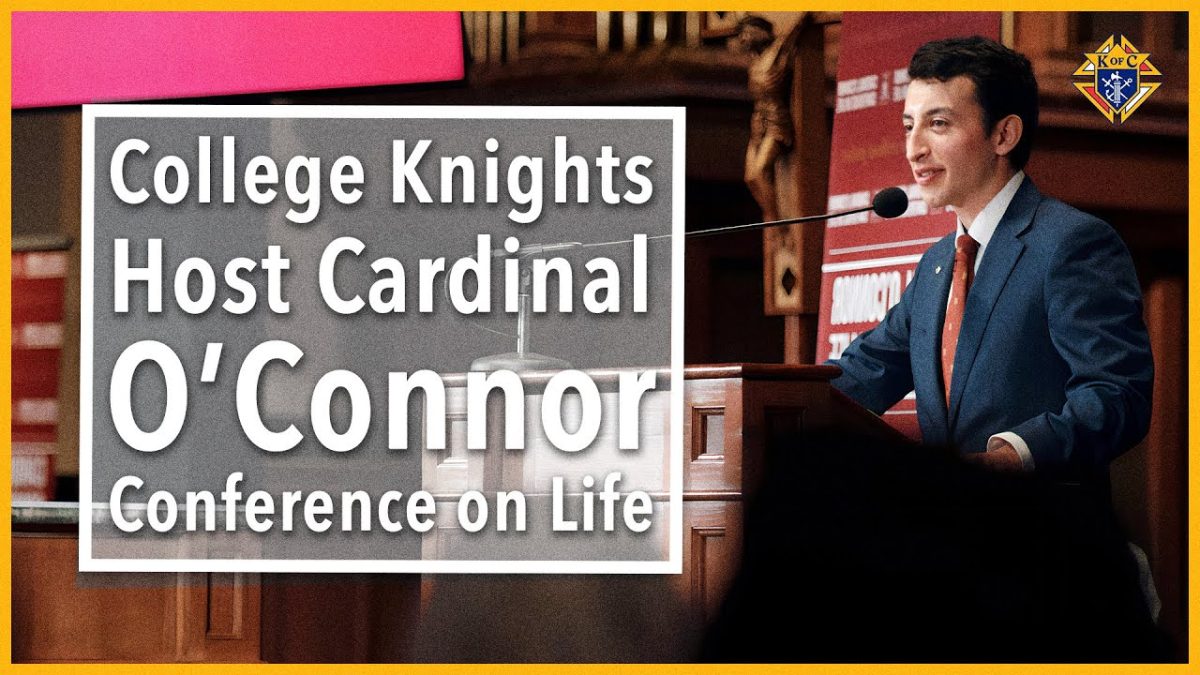
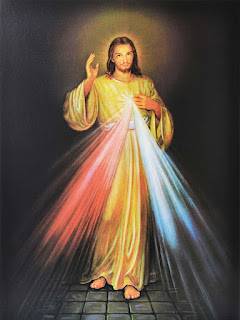
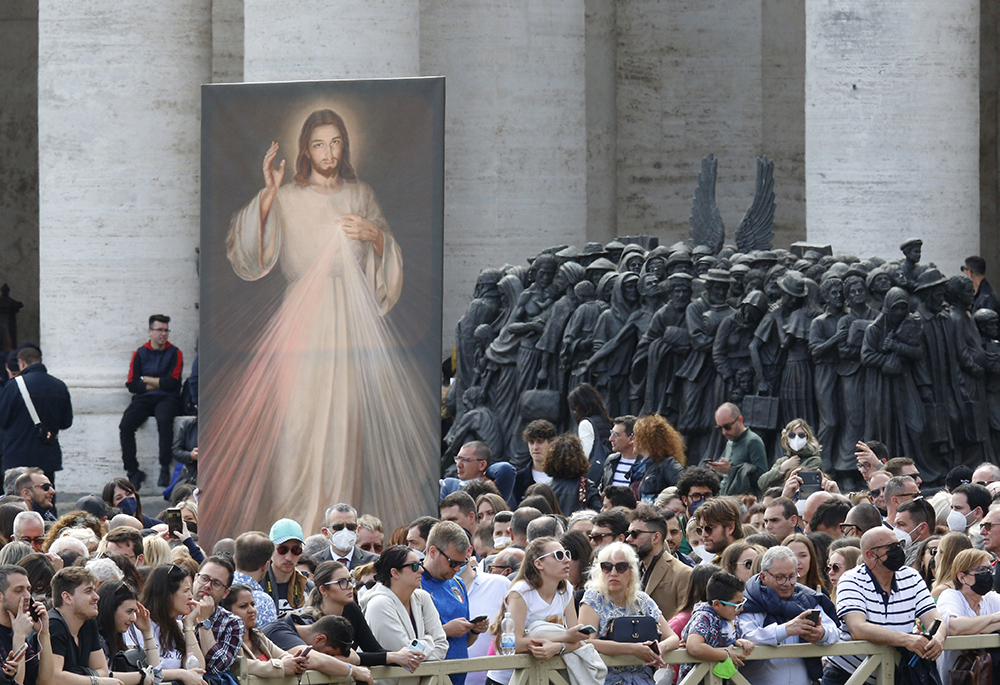

Mercy. What are we asking for when we ask for God’s mercy? Because we use the word during the penitential rite in our Eucharist, we often think of the plea for mercy as a petition for forgiveness, but that’s not at all what the Scriptures tell us.
Not only that, but the word mercy (eleos in Greek) is nowhere near as common in the Gospels as we might think. While John never used the word, Luke might be its champion with about 10 references to the mercy of God and Jesus or the good Samaritan and the prodigal father. In today’s Scriptures, the only time we hear the word is in 1 Peter which praises God for showing us mercy by giving us new birth through the Resurrection.
What it comes down to is that mercy is an action, not an emotion. If we look to Luke’s human examples, we first see mercy was what the Samaritan did as he risked his life and put his goods at the service of a person in need. In the father and son story, the father practiced mercy by embracing his son and throwing a party for him. (Although the wayward son talked about sin, the father said absolutely nothing about sin or forgiveness — that was the role of the older brother.) Mercy is thus a concrete and generous response to another’s need. This leads us to ask what today’s readings tell us about divine mercy.
Today’s Gospel takes place on the evening of the day of the resurrection when Jesus appeared in the midst of the disciples. Although classical artworks depict this scene with Jesus and the 11, there is no reason to assume that the group, like that at the Last Supper, did not include other women and men. John takes care to remind us that it was evening and the doors were locked. It was as if, after seeing Jesus’ empty tomb, the disciples had made a sepulcher of their own meeting place. They who had mourned his death had become like the living dead, ashamed of their cowardice, afraid, and unable to believe Mary of Magdala’s announcement that she had « seen the Lord » (John 20:18).
John tells us that Jesus came and stood among them. Earlier, Mary of Magdala had sought him. Now Jesus sought out the disciples. To Mary, he had said, « Do not cling to me … but go and tell my brothers ‘I am going to my Father and your Father.’ » By saying this, Jesus handed over his mission, authorizing Mary as the first Christian apostle. Later, when he came to the disciples, the mission he handed over was more than a simple proclamation: « As the Father has sent me, so I send you. Receive the Holy Spirit. »
Whether in the garden cemetery or the locked room, Jesus’ appearances were not just revelations of the resurrection; they aimed at transforming disciples into apostles. Jesus expressed his active mercy by breathing into them the Holy Spirit, the vital principle of his own life. Jesus mentioned nothing of their failure to stand with him, rather, like the father who restored his wayward son as an heir, Jesus gave them his mission: specifically, a mission of forgiveness.
This tells us not only about mercy, but also about forgiveness. If we think about it, Jesus never focused on sin. He mightily criticized people who denigrated or excluded others, but sin was never his focus. For Jesus, acts of mercy restored people, empowering them to live the fullness of their potential. In the long run, that asks much more of people than simply being sorry for sin.
Where does this leave us on Divine Mercy Sunday? Peter seems to summarize it as he tells us, « Rejoice in the God who gives you new birth to living hope. » It’s too easy, almost egoistic, to dwell on our failings and feel sorry. The God who proclaimed that sacrifices « have become a burden to me » (Jeremiah 6:20) has no need or desire for our sadness, but beseeches us, « Let justice surge like a river » (Amos 5:24).
On this Sunday, Mary and the other disciples would probably tell us, « Be careful about asking for God’s mercy! It comes with the uncomfortable grace of a vocation. » After the Resurrection, the church is irrevocably called out of hiding and into mission. Pope Francis tells us to abandon fear of mistakes, but instead to fear « remaining shut up within structures … rules … habits … while at our door people are starving » (Evangelii Gaudium, 49).
On this Divine Mercy Sunday, can we be bold enough to ask for and act out divine mercy?